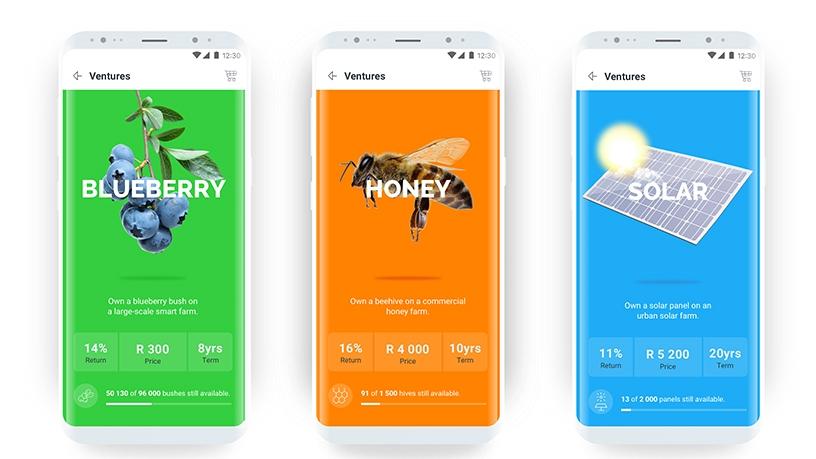
A new app, called Impact Farming, lets users buy individual bee hives, blueberry bushes or solar panels on commercial farms and earn returns of between 10% and 16%.
Impact Farming is a product from Fedgroup, which wanted to offer clients a way to get into 'impact investing', a worldwide trend that sees investors investing in businesses that benefit society or the environment.
Fedgroup believes investing directly into sustainable ventures, instead of on a stock exchange, is a smarter alternative. "That's because investing in shares and funds can be unnecessarily complex, and hidden costs and fees eat into your returns. In addition, barriers to entry can be prohibitive," the company says in a statement.
The Impact Farming mobile app lets users buy assets from accredited farming partners, including blueberries, sustainable honey and urban solar farms, for as little as R300.
"It's basically the ability for the man on the street to own a revenue-generating asset that is part of a larger operation. Normally you'd need hundreds of millions of rands to do something like this as an individual, or settle for traditional financial structures where you don't actually own the asset and everything is eaten up in hidden costs," says Grant Field, CEO of Fedgroup.
Within the app, a user will buy a farming asset. This is then grown on a commercial-scale farm (or placed on commercial building rooftops in the case of solar), along with all the assets of other individual investors.
The assets then generate a product (blueberries, energy, honey and wax), which is sold to market, and the proceeds are shared between the investor and the farmer, with Fedgroup taking a platform fee in between.
An example of the platform fee rate would be R3 a year on a R300 blueberry bush. Investors are paid twice a year for blueberries and honey and monthly for solar.
Field says honey, blueberries and solar panels were chosen because of a rigorous due diligence process that showed they were economically viable, low-risk, and have a positive effect on people and the planet.
"In the case of honey, it is fairly widely publicised that honeybees are under threat, and there is also an undersupply of honey in the South African market. Issues such as the adulteration of honey with substitutes are receiving broader awareness and we believe that we can assist in securing bee populations in South Africa, while increasing the supply of pure honey in the market.
"Blueberries are touted as a 'wonder food' and the global supply cannot keep up with demand. SA is also counter-cyclical to the northern hemisphere, making export into UK and European markets highly lucrative in their off-season (we have contracts and service level agreements with partners and off-takers both locally and abroad).
"And solar is a renewable resource and, in the South African context, also acts as a hedge against rapidly increasing electricity prices," explains Field.
The company says it intends to broaden the range of crops on offer in time.
The assets are also insured, the cost of which is included in the purchase price. Therefore, if a blueberry bush, bee hive or solar panel is ever destroyed in a natural disaster, Fedgroup replaces it.
Field says he is not aware of this business model being used anywhere else in the world.
Fedgroup has multiple other financial services licences and still offers traditional products and services to the market. It says it tried to do something different with Impact Farming.
"We have tried to get rid of the complexity of a traditional financial services model where assets would be placed into financial structures such as funds. Impact investing is a global buzzword, but this generally translates into some type of sustainability/impact fund.
"Our cynical view is that, often, this is done to hide costs and fees, and extract as much value for the financial institution as possible, rather than the investor," says Field.
"We have rather launched a classic peer-to-peer type model where a number of investors (asset owners) are in essence funding a commercial-scale project, with a farmer (or building owner, in the case of solar) on the other end who needs access to funding. The investor actually owns the physical asset in the case of beehives or solar panels (with individual serial numbers, etc), and proceeds from the produce in the case of blueberries (we only use very specific, licensed varietals where one cannot actually own the bush)."
Field says with this type of model, the big winners are the investors and the farmer, while Fedgroup makes a margin in between.
Impact Farming has been running as a proof of concept since October 2016, but it was only launched to the public in the last week. The company says it is in its very early stages, but it is currently getting around 100 new sign-ups a day.
Share